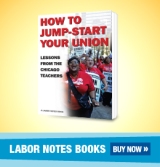by Stan Sorscher

Stan Sorscher
An editorial in my local paper is a good example of how we trivialize our public discussion of globalization and trade policy.
The editorial follows this logic: Trade is good. All trade is good. More trade is better than less trade. Maximum possible trade! Anyone who disagrees is protectionist or resentful.
I can immediately correct one misunderstanding. Everyone I know is in favor of trade. I am 100 percent in favor of trade. The issue is not “trade.” The issue is good trade policy, which raises my standard of living, or bad trade policy, which lowers it.
Similarly, I am in favor of capitalism. Even so, we can have real, significant, meaningful, legitimate debates about good rules for capitalism and bad rules for capitalism.
I am in favor of banks. We deserve serious policy debates about banking.
I am 100 percent in favor manufacturing. China’s manufacturing capacity is prodigious. It grows on the misguided principle of maximum possible output. As a result, air pollution in China is legendary, causing 750,000 premature deaths per year. In America, we debated clean air and clean water. Our public health and living standards are better for that debate.
I am in favor of copper, iron ore and titanium. However, it is bad trade policy for international trade tribunals to compel El Salvador to expose their people to unsafe mining practices, threatening more than a third of their clean water. Maximum possible mining threatens public health and safety in El Salvador.
It is bad public policy for a trade tribunal to overturn Ecuador’s $18 billion environmental penalties against Exxon, compelling the national courts to back down in the face of trade sanctions. Exxon has already damaged the environment, and been found guilty in court. Bad trade policy punishes Ecuador instead of Exxon.
These concerns are not new. Past trade negotiations identified them in writing, but dealt with them ineffectually.
For instance, when China entered the WTO in 2001, it signed an “accession agreement” with several conditions designed to make trade a two-way deal. China’s national policies flagrantly violate those conditions. China openly manipulates its currency. China demands that U.S. companies transfer technology to Chinese domestic producers. Foreign companies are discouraged or prevented from selling to China’s domestic consumers, and Chinese producers receive subsidies and incentives that drive our producers from the market.
Free speech, free press and labor standards are notoriously weak in China. China has a rich history and amazing culture. However, they lack the institutions of civil society for democratic debate about serious policy issues.
This harms workers and producers in America.
In our NAFTA and WTO debates, advocates of so-called free trade promised us a rising standard of living, balanced trade and millions of good new jobs. Instead, U.S. companies shifted 2.4 million jobs abroad, while eliminating 2.9 million jobs in America. Our cumulative trade deficit since NAFTA is over $7 trillion. Our economy is de-industrializing, and we are losing strategic opportunities to produce the next generations of products.
These are fundamental flaws in our trade policy that lower our standard of living — well worth a serious public discussion. Nineteenth century “free trade” theory may work well in a textbook, but it has profound conceptual, economic, social, environmental, and political shortcomings in our real 21st century global economy.
Challenging bad policy is the way democracy works.
Both Barack Obama and Mitt Romney found fault with aspects of our trade policy (at least during election campaigns). Candidate Obama recognized the weaknesses in our trade theory, and promised better trade agreements all through the campaign. Candidate Romney says action on China’s currency manipulation will be a top priority.
In at least one respect, our so-called free trade policy is fabulously successful. It’s really about putting investor and business interests at the highest priority, while sweeping aside the environment, labor rights, human rights, public health and reasonable regulations. Investors go first; civil society comes after. Maximum possible trade! It’s great for companies who move production to countries with low-wages and weak democracies.
Dave Johnson says this in plain language:
The business advantage China offers is not low wages — it is that in China the people do not have a say, and here people have a say. When people have a say they say they want better pay, health care, retirement, vacations, sick pay, protections, worker safety, clean environment and taxes to support the country — things like that — the very things China offers to let our businesses escape from.So what China offers is that China is “business-friendly.” Because people there do not have a say, so they can’t ask for the things people should have.
When our newspapers and policy-makers trivialize globalization and dismiss legitimate public concerns as “resentment” or protectionism, they weaken our democracy.
The Trans-Pacific Partnership (TPP) is the Obama administration’s signature trade agreement, which is being negotiated in total secret. Text was leaked recently, showing that TPP will be worse than the past agreements. A crummy deal, negotiated in secrecy is not saying much for democracy.
Popular disillusionment with so-called free trade is real. It is based on personal experience, rational analysis, and looking out the window.
Voters, workers, families and Main Street businesses sense serious problems with our domestic economy. Whatever those problems are, they are made worse by so-called free trade. We won’t solve either unless we deal with both.
Stan Sorscher is Labor Representative at the Society for Professional Engineering Employees in Aerospace (SPEEA), a union representing over 24,000 scientists, engineers, technical and professional employees in the aerospace industry. He has been with SPEEA since 2000.
Filed under: Uncategorized | Tagged: Free Trade, NAFTA, Trans-Pacific Partnership, WTO | Leave a comment »











